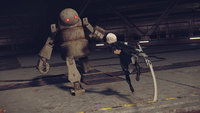|
|

|
PLATFORM
|
PS4
|
BATTLE SYSTEM
|

|
INTERACTION
|

|
ORIGINALITY
|

|
STORY
|

|
MUSIC & SOUND
|

|
VISUALS
|

|
CHALLENGE
|
Adjustable
|
COMPLETION TIME
|
20-40 Hours
|
|
OVERALL

|
+ Excellent soundtrack
+ Deep and varied combat systems
+ Non-traditional premise and storytelling
- Ending can be unsatisfying
- Combat doesn't reward mastery
|
Click here for scoring definitions
|
|
|
Developer Cavia, or more specifically their lead director Taro Yoko, is a bit of an odd duck. Attached to industry behemoth Square Enix, he nonetheless produces experimental games that feel more indie than AAA. Marked by creative risks that fail as often as they succeed and a sometimes bizarre approach to storytelling, it's hard to mistake one of his games for someone else's. However, many of them fall short mechanically, being often tedious to play and not especially interesting to look at. NieR in particular received high praise for its story and music, but it's impossible not to mention its boring gameplay. What, then, can we expect when he partners with action-game superstar Platinum Games to make a sequel? Unfortunately, not a perfect game. The soundtrack is once again excellent, but the story doesn't quite reach the emotional peaks of the original. And while the combat is vastly improved, it has its own flaws as well. Make no mistake, NieR: Automata is a great game, but it could have been better.
Our story begins in the year 11945 AD. Nearly 7000 years ago, the Earth was invaded by aliens. Unable to stop the aliens' army of self-replicating robots, humanity was nearly wiped out, with the few remaining survivors fleeing to a Moon colony. Not content to abandon their homeworld forever, the humans then created android armies with the end goal of eventually reclaiming Earth from the machines. It's this same millennia-old conflict that protagonist 2B has been born into, created solely to fight in what by any reasonable estimation is an unwinnable war against an enemy that the game quickly makes clear is only barely understood. Not that she has any reason to question it, as propaganda messages routinely tell her the androids are on the cusp of victory. Either way, she's first and foremost a soldier and is willing to give her life for the cause.
Her life may not have as much value as one might expect, though. Androids in her organization are expected to regularly back-up their memories on a central server (ie: saving the game), so death for 2B means at worst a few hours of amnesia and a reprimand for wasting expensive back-up bodies. Or does it? While the story takes the philosophical questions it raises in some wonderful directions, the death system is also a full gameplay mechanic. Borrowing a page from the Dark Souls series, whenever 2B dies, she leaves a corpse on the ground that contains some of her equipment and must be recovered. With an internet connection, other players' corpses can also be found, to be either reclaimed for temporary stat buffs or repaired for a temporary ally. However, without the punishing difficulty of Dark Souls, this system lacks the same weight, especially since healing items are plentiful and can be used instantly. It's even possible to save and reload the game normally, which takes a lot of the bite out of it, both in gameplay and as a story element.
 The tragedy of robot on robot violence.
The tragedy of robot on robot violence.
|
|
Gameplay itself is fast-paced and reminiscent of Bayonetta. 2B can equip two melee weapons at a time, each assigned to either quick or heavy attacks, and dodge through enemy attacks with a flashy animation. There's even an upgrade that can be equipped to slow down time after a dodge, exactly like Bayonetta's Witch Time system. The combo system has an astonishing amount of depth, with each weapon having different combos that can change completely with small differences in input like holding down the button or pressing it late. Ranged attacks can be executed and skills can be charged up without interrupting other attacks. There are even combined attacks that use both of 2B's melee weapons at once, leading to countless permutations. The myriad ways to take on robots is simply fun and engaging, which makes it a shame that the mechanics don't encourage the use of any of these fancy maneuvers, as good dodging is pretty much all that's needed to beat the game. Large level differences can also make battles tedious, as enemies with higher defense and HP take exponentially longer to kill without being any harder to dodge. This is especially problematic because sidequests don't specify a recommended level.
This isn't to say that the combat is repetitive. NieR: Automata loves to play with camera angles and alternative forms of gameplay. Often the camera will sweep to the side and turn the game into a 2D platformer, or face straight down from above and become something like an old Zelda game. These transitions are made with minimal control fuss, so the player won't be frustrated by their movement inputs suddenly changing direction, though at times the camera can be zoomed out too far to see what's going on. There are also flight sections where the game become a sidescrolling shmup, which are a bit blander than normal combat, but don't show up often enough to be unwelcome and often accompany exciting boss fights anyway. What's especially impressive, though, is the hacking mini-game. Robots will sometimes try to hack 2B in the middle of battle, and whenever this happens, the screen suddenly transitions into a quick shooting mini-game. The gameplay is incredibly simple, but that works in its favor. Hacking sessions generally last under 10 seconds, and the player is immediately thrust back into battle when it's over. While that may sound jarring, the transition is smooth and the music seamlessly becomes an 8-bit version of itself. Even the tiny moment of shock from being unexpectedly hacked by an enemy feels just right for what is essentially a psychic attack on 2B. Failure can lead to various status ailments, while success can force the enemy to self-destruct for massive damage.
The RPG half of action-RPG isn't quite as well developed, but is still enjoyable. Equipping weapons is straightforward enough—and Drakengard fans will be happy to hear that weapons unlock stories of their previous owners when upgraded—but the game gets a great deal of customizability out of the plug-in system. Plug-ins act as passive skills or accessories that can be equipped to 2B's memory, which can be upgraded to fit more plug-ins. What makes them interesting is how creative the developers are with their effects. Not only are basic HUD elements considered plug-ins, allowing the player to remove health bars and minimap indicators in exchange for more power, but the combat plug-ins can have huge effects on gameplay, ranging from the aforementioned time-stop on dodges, to melee attacks shooting ranged shockwaves, to even adding mercy invincibility after getting hit. Many of them would normally be core gameplay elements in other games, and being able to play around with them is quite fun. Just be sure not to remove 2B's starting OS plug-in or you might regret it. That's just the sort of game this is.
 It should go without saying that you can also ride a moose in this game.
It should go without saying that you can also ride a moose in this game.
|
|
Speaking of twisted game mechanics, there are a huge variety of them. In addition to the OS trick, there are numerous other unusual ways to disrupt events, like killing plot-important NPCs or deserting from major battles. Actual endings are rarer, and frankly many of them shouldn't really be called endings, as stopping the game there would lead to an incomplete game experience. Instead, loading the clear data from one of those endings leads into what's really the next chapter of the game, with all sidequests and other indicators of game progression still completed. These new chapters have more story developments and sometimes even new gameplay elements. That said, even the true ending will leave some players a bit unsatisfied. Other scenes lack almost all emotional weight without the context of the original NieR.
Fans will be looking forward to the soundtrack, and it does not disappoint. Keiichi Okabe returns as musical director, with Emi Evans as the main singer for the game's primarily vocal soundtrack, and their work is just as impressive as ever. Consistent with the previous game, it features powerful, emotional tracks with a faint feeling of melancholy even during the most exciting moments. They're generally sung in nonsense languages based on the phonetics of real world languages, giving them a sense of realism despite the lack of any actual meaning. This isn't just background music, it's a major selling point of the game. Songs fade between multiple variations depending on where in the scene or location they play. Voice acting is available in both English and Japanese, and while nothing stands out, all the actors portray their characters well and without breaking the player's immersion in the story.
The high quality graphics look like what one would expect from a PS4 game. A lot of care went into the art direction as well, with the colors starting out fairly dull in the early areas—one location is even shot entirely in black and white—before becoming more colorful as more of the world gets explored. The contrast between the robot factions is also especially prominent. Enemy machines are crude, clunky, and slightly unsettling, while the androids are almost excessively stylish and sleek, ie: women in high heels doing flips while cutting robots with katanas. During hacking sequences the world is reduced to simple blocks sliding around on a board, but it's still high resolution and smooth. The combat animations make the player feel appropriately like a badass, and in cutscenes 2B is capable of emoting even with a blindfold on, so clearly they're doing something right. The game is also kind enough to provide an option to automatically adjust the camera settings to reduce motion sickness.
NieR: Automata is an odd case where the game feels worse than the sum of its parts. Each individual element is high quality on its own, but there are enough flaws to bring down the overall experience. The story goes in very interesting directions but fails to land the ending, and the combat has a lot of depth but fails to encourage the player to explore it, which combine to make the whole thing feel just a bit hollower than it should be. Anyone who liked NieR or Drakengard will love this game just for how it presents itself and the ideas it explores, but fans of action games or slightly thoughtful sci-fi stories will find a lot to appreciate too.
Review Archives
|









